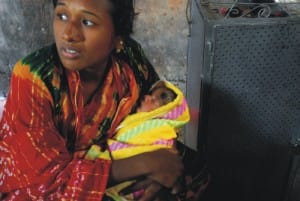Saddam's mom and Bush's dad

Munem Wasif/ Drik News
It was early in the morning after the Iraq war had taken place. Someone knocked on our door.
"Who is there?" I enquired from inside.
"It's me, Saddam's mom." The answer came.
"Please bring Bush's dad." I could not resist the temptation to make the joke.
"He is at home." Came the answer to make my eyeballs explode.
Later on, I came to know that Saddam's mom was our newly appointed chuta booa, or part-time housemaid, who lived in the nearby slum. She had two sons. The elder one was named after Saddam Hussein, and the younger one after Bush. What a coexistence of two archrivals! At that time Saddam was alive.
A few days later, Saddam's mom came to our house with a friend. The friend was a young woman in the mid-20s, and her daughter. She, recently divorced, came from another slum to stay with Saddam's mom for a few days.
After a week, Saddam's mom came to our house, sobbing like a baby.
"What's happened to you? Why are you crying?"
"Yesterday Bush's dad fled away with my friend."
"Where?"
"I don't know; perhaps to another slum."
Poor soul, what will she do with her two sons? How will she feed them; let alone meet their other basic needs? During the time of distress of her friend, as she was divorced, she extended her hands to her to heal her wounds, only to be repaid in such a cruel way.
There was every possibility that Bush's dad fled with the friend of Saddam's mom to a remote slum in Dhaka city -- far from the slum in which he had lived with Saddam's mom. It is impossible for Saddam's mom to find them, as slum dwellers are untraceable when they move from one slum to another.
Anyway, that was not the end of the story. A few more days passed, and Saddam's mom came to our house smiling, beaming with joy.
"What's happened to you, Saddam's mom? You look so happy."
"Last night Bush's dad came back, dumping that woman."
Perhaps Bush's dad married the friend of Saddam's mom after they had fled; and he divorced her before he came back to Saddam's mom. In the slums, marriage and the divorce take place in such an easy way.
"You know well that one and a half kg sweet is enough for a marriage to take place in the slum," I once overheard a slum-dwelling woman telling another. That comment is nearly true. To hold a marriage in a slum one needs the bride and the bridegroom, a moulobi, two men, or a man and two women, as the witnesses to the marriage, and two kg of sweet to be distributed among the few guests who come to attend the marriage ceremony.
Marriage registration is almost unknown to slum dwellers. To divorce a wife is easier than to marry her. Out of ignorance of the religious edict to be followed by the husband regarding divorce, people living in the slums believe that to divorce the wife the man needs to utter the word Talak three times in a row and the marriage dissolves immediately.
According to Islam, to divorce the wife a man needs to pronounce the word Talak three times, not at once but once on each consecutive three moons. That means it takes three months to divorce a wife. After pronouncing the word talak once or twice, a man has the time to ponder whether or not to pronounce the word the third time.
Civil law in Bangladesh has laid out the ways by which the wife can divorce the husband, and vice versa. It is mandatory to follow that civil law.
Marriage registration in Bangladesh, another civil law, is also compulsory. But, in most cases, the law is not followed in the slums, as if they belong to a different world -- an unknown world outside the reach of the law of the land.
In Bangladesh, we are divided into two societies -- the haves and the have-nots. The slum dwellers, who belong to the have-nots, are living in the world of lawlessness. The biggest sufferers of the lawlessness in the slum-world are the women.
It is very common in the slum to see a man abandon his family at will, leaving behind no trace. Feeding the children becomes the sole responsibility of the mother, who herself is helpless. A street urchin, when asked about his family, answers, "I live with my mom and other siblings. I don't know where my dad is, he left us long ago."
It is time to make the people living in the slums aware about the personal (religious) and civil laws regarding marriage and divorce. The government and NGOs may conduct an awareness program on marriage and divorce in the slum.
TV and radio programs, documentaries and short films may also help. These awareness programs will also help the people living in the villages to get rid of their age-old ignorance about marriage and divorce.

 For all latest news, follow The Daily Star's Google News channel.
For all latest news, follow The Daily Star's Google News channel. 



Comments